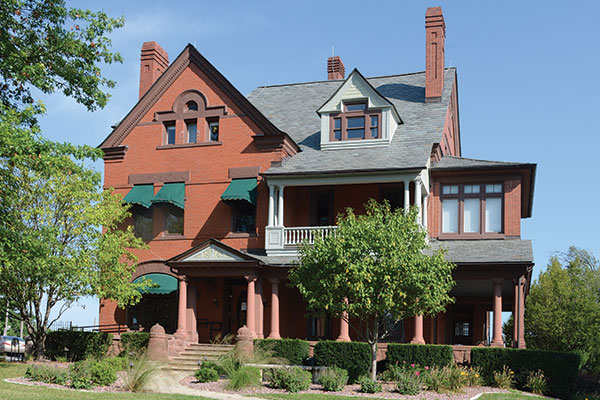Above: A lot of good things come out of this old house at 1915 Grand Ave., home of the Community Foundation of Greater Des Moines.
online pharmacy flomax no prescription with best prices today in the USA
BY STEVE DINNEN
online pharmacy http://solidgroundpsychotherapy.com/wp-content/uploads/backup/2024/02/champix.html no prescription pharmacy
online pharmacy robaxin online with best prices today in the USA
Being charitable is a little more complicated than just cutting a check. You first have to identify who will receive it, and why, then tend to bookkeeping and legalities, and maybe make some tax moves, and then ideally follow up to see that your money is being used wisely.
At the O’Halloran Family Foundation, benefactor Jim O’Halloran was doing it all on his own for many years after he launched his effort to give something back to the community (he founded truck dealership O’Halloran International in 1981). Then it came to the attention of family members such as his daughters Anne Broderick and Beth Gookin, who oversee the foundation today, that they might enlist the Community Foundation of Greater Des Moines to bolster their efforts.
The result? “It has been helpful,” Broderick says. “It has been reaffirming.”
For starters, the Community Foundation handles much of the paperwork. It tackles accounting, auditing, due diligence and check-writing duties that otherwise would be shouldered by the O’Hallorans. Importantly, it then can identify appropriate donation opportunities after, Gookin says, “we identify what’s important to us.”
With the assistance of consultant Kaye Lozier, the sisters identified goals and values for the foundation. Immigration and refugee support was one area of interest; others were empowering women and supporting arts and culture.
With that in mind, Broderick says, the Community Foundation researched and identified candidates worthy of support. The Foundation turns 50 this year, and by now has developed knowledge of every charitable organization in Central Iowa. That has a come in handy, the sisters say, in identifying which entities would be of interest to them.
Lynne Yontz, chief charitable giving officer at the Community Foundation, says her organization has helped arrange interviews between givers, such as the O’Hallorans, and recipients so the two can discuss mutual goals. They also have arranged on-site visits so that donors can get a personal feel for the activities of a potential beneficiary.
Community foundations such as Greater Des Moines’—there are a number across the country—are legally recognized as entities that basically serve as conduits between donors and recipients. Donations that pass through them are entitled to all eligible tax benefits, and they handle administrative paperwork as well as investment services for funds that are awaiting disbursement.
Broderick and Gookin say their relationship with the Community Foundation of Greater Des Moines has worked to boost the efficiency of their family foundation.
“It has guided our giving,” says Broderick.
At the O’Halloran Family Foundation, benefactor Jim O’Halloran was doing it all on his own for many years after he launched his effort to give something back to the community (he founded truck dealership O’Halloran International in 1981). Then it came to the attention of family members such as his daughters Anne Broderick and Beth Gookin, who oversee the foundation today, that they might enlist the Community Foundation of Greater Des Moines to bolster their efforts.
The result? “It has been helpful,” Broderick says. “It has been reaffirming.”
For starters, the Community Foundation handles much of the paperwork. It tackles accounting, auditing, due diligence and check-writing duties that otherwise would be shouldered by the O’Hallorans. Importantly, it then can identify appropriate donation opportunities after, Gookin says, “we identify what’s important to us.”
With the assistance of consultant Kaye Lozier, the sisters identified goals and values for the foundation. Immigration and refugee support was one area of interest; others were empowering women and supporting arts and culture.
With that in mind, Broderick says, the Community Foundation researched and identified candidates worthy of support. The Foundation turns 50 this year, and by now has developed knowledge of every charitable organization in Central Iowa. That has a come in handy, the sisters say, in identifying which entities would be of interest to them.
Lynne Yontz, chief charitable giving officer at the Community Foundation, says her organization has helped arrange interviews between givers, such as the O’Hallorans, and recipients so the two can discuss mutual goals. They also have arranged on-site visits so that donors can get a personal feel for the activities of a potential beneficiary.
Community foundations such as Greater Des Moines’—there are a number across the country—are legally recognized as entities that basically serve as conduits between donors and recipients. Donations that pass through them are entitled to all eligible tax benefits, and they handle administrative paperwork as well as investment services for funds that are awaiting disbursement.
Broderick and Gookin say their relationship with the Community Foundation of Greater Des Moines has worked to boost the efficiency of their family foundation.
“It has guided our giving,” says Broderick.
buy amoxil online buy amoxil online no prescription
online pharmacy topamax over the counter with best prices today in the USA
online pharmacy buy imuran online no prescription










